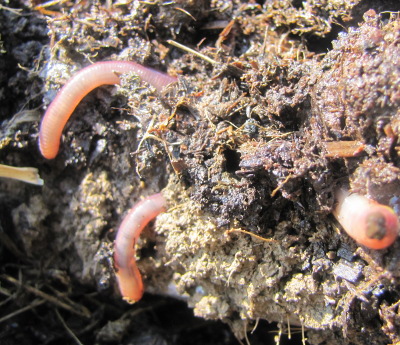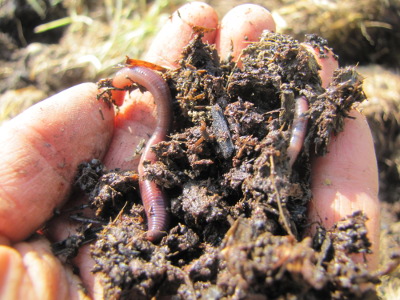
How to run a worm test
 We
have a couple of hundred garden beds that have each been treated
differently over the years, so it's a bit daunting to consider running
soil tests on them all. Luckily, there are quick and dirty,
at-home tests you can do to get an idea of the state of your
soil. My favorite is the worm test, which gives you an idea of
overall soil health (with a strong focus on organic matter.)
We
have a couple of hundred garden beds that have each been treated
differently over the years, so it's a bit daunting to consider running
soil tests on them all. Luckily, there are quick and dirty,
at-home tests you can do to get an idea of the state of your
soil. My favorite is the worm test, which gives you an idea of
overall soil health (with a strong focus on organic matter.)
To do a worm test the
right way, wait until the soil is at least 55 degrees Fahrenheit and is
damp but not sopping wet. Then dig out one cubic foot of soil ---
make a square on top of the ground one foot on each side and dig down
one foot deep. Put the dirt in your wheelbarrow or on a piece of
cardboard and root through it, counting worms as you go. If you
find at least ten worms, your soil passes the test, and more worms
means better soil. For really scientific results, repeat the worm
test in several parts of your garden that have all been treated the
same way and average your results.
 Alternatively, there's my
method of doing a worm test. As you play in the dirt, planting
potatoes or ripping up weeds, keep an eye on how many worms you
see. This spring, I noticed that the amazing
horse manure compost
Mark got for me is a worm magnet --- one small handful of
compost-treated soil can hold as many as six hefty worms! On the
other hand, the imperfect
chicken manure compost
that I used last year to create new,
no-till beds for our tomatoes is nearly worm-free.
(The tomatoes didn't seem to mind.)
Alternatively, there's my
method of doing a worm test. As you play in the dirt, planting
potatoes or ripping up weeds, keep an eye on how many worms you
see. This spring, I noticed that the amazing
horse manure compost
Mark got for me is a worm magnet --- one small handful of
compost-treated soil can hold as many as six hefty worms! On the
other hand, the imperfect
chicken manure compost
that I used last year to create new,
no-till beds for our tomatoes is nearly worm-free.
(The tomatoes didn't seem to mind.)
If your soil is low on
worms, there could be several problems. In the case of my
imperfect compost, I suspect that high salts are responsible for
turning the area into a worm-free zone, and worms will also die if your
soil is consistently too wet, too dry, too acidic, or too
alkaline. On the other hand, worms adore mostly decomposed
organic matter (aka compost) and the damp soil underneath mulch (and
no-till gardens in general.) Since worms
do so much good in your soil, it's worth thinking of ways
to keep them happy.
Want more in-depth information? Browse through our books.
Or explore more posts by date or by subject.
About us: Anna Hess and Mark Hamilton spent over a decade living self-sufficiently in the mountains of Virginia before moving north to start over from scratch in the foothills of Ohio. They've experimented with permaculture, no-till gardening, trailersteading, home-based microbusinesses and much more, writing about their adventures in both blogs and books.
Want to be notified when new comments are posted on this page? Click on the RSS button after you add a comment to subscribe to the comment feed, or simply check the box beside "email replies to me" while writing your comment.

This post was reassuring as I live in a city with highways and major roads less than a kilometre away. I have lots of worms in my garden soil but does that help me know about pesticides and toxins? I rent and I know the owner has used cheapie "landscapers" in the past and who knows what they were using for weed control. Because of the roads nearby, I wonder about lead in the soil. Has anyone written about this anywhere? Worms indicate that there is sufficient organic material to have good roots (and nutrient uptake, etc) right?
Like I said, I am thrilled to always see tons of worms (and big ones!) but I wonder if the urban worm has adapted to contaminated urban environments? (though I do live in area that is far from industrial sites -- it's always been residential here) There are areas in this city where people are told to not eat food plants grown in the soil because of the heavy metals in the soil from industry. I wonder if worms help with "processing" that? I've heard that worms can do amazing things to clean up soil.
I've had several people ask me about whether it's safe to eat foods grown in the city, so I did a quick search of the internet. The best document I found was "Urban Agriculture and Soil Contamination" at http:// cepm.louisville.edu/Pubs_WPapers/practiceguides/PG25.pdf. They recommend:
Try to figure out if there are point sources of pollution nearby (or have been in the past.) Gas stations and mechanics, industries, landfills, etc., are prime problems, but you'll also get heavy metals like lead or mercury if runoff from your street flows into your yard. Lead paint, treated lumber, fertilizers, and pesticides are possible sources of contaminants in your own yard. (I didn't realize this, but pesticides often contain heavy metals.) And, if you live at the bottom of a hill, you could get contaminants coming in from uphill in the groundwater.
If you're concerned, get a soil test done specifically for what you're concerned about. It's a lot cheaper to ask a lab to test your soil for lead than to ask them "is there anything wrong with my soil?" It sounds like a soil test could cost $20 or less.
From my own reading, I'm starting to feel like a healthy soil ecosystem can break down just about any problematic compound except heavy metals. I don't think it's the worms as much as the fungi that do the hard work, but either way, adding organic matter feeds the organisms that clean your soil up.
So that's where I'd focus my energy --- first, figure out if there are heavy metal problems, and if not add lost of organic matter so that your soil ecosystem can deal with other problems. It also looks like lots of cities are getting interested in soil contamination, so you might have a non-profit or government agency in your neck of the woods that can help with testing, remediation, etc.